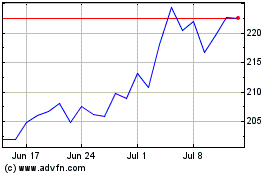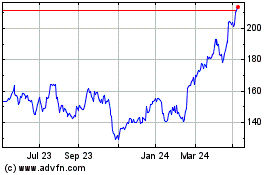Nasdaq Slips as Biotechnology Shares Decline
February 23 2017 - 2:37PM
Dow Jones News
By Riva Gold and Akane Otani
Declines in biotechnology shares dragged down the Nasdaq
Composite, pressuring an index that has soared so far this
year.
The Nasdaq fell 0.5% on Thursday but is up more than 8% in 2017,
outperforming both the Dow Jones Industrial Average and the S&P
500, which are up more than 5%. The tech-heavy index has closed at
a fresh high 19 times so far this year -- its most records in a
year since 1999, according to the WSJ Market Data Group.
The Nasdaq Biotechnology Index shed 0.4% Thursday while
technology shares also slipped, putting the Nasdaq Composite on
course for a second straight day of declines. Shares of Intercept
Pharmaceuticals fell 6.5% and Nvidia fell 9.7%.
The S&P 500 rose less than 0.1% and the Dow industrials rose
0.2%, on course to close at a fresh high.
Stocks have climbed since Election Day, as corporate earnings
have improved, data has shown growth in the U.S. economy and
investors have bet the new U.S. administration will implement tax
cuts and fiscal stimulus.
"The outlook for earnings got a bit better, regardless of the
election. Then you throw on top of that perhaps a more
business-friendly environment and confidence has improved," said
Matthew Peron, head of global equities at Northern Trust Asset
Management.
Some investors remain cautious, however, noting stocks are
getting expensive. Companies in the S&P 500 traded at about 22
times their past 12 months of earnings as of Wednesday, above their
10-year average of 15.8, according to FactSet.
"It feels to me like the market is pricing in a lot more
optimism than it should be," said David Lafferty, chief strategist
at Natixis Global Asset Management.
Gains in oil prices helped lift shares of energy companies
Thursday. The S&P 500 energy sector rose 0.4%, with Transocean
and National Oilwell Varco posting some of the biggest advances.
Gains in Exxon Mobil and Chevron helped keep the Dow industrials in
positive territory.
U.S. crude oil jumped 1.5% to $54.40 a barrel as data showed
major oil producers have largely kept their promise to reduce
output and tackle a global supply glut.
Shares of industrial companies fell 0.9% in the S&P 500,
weighing on the index. United Rentals fell 5.4%.
Government bonds and their stock-market proxies gained.
The yield on the 10-year U.S. Treasury note edged lower to
2.393%, according to Tradeweb, from 2.416% Wednesday. Yields fall
as bond prices rise.
Shares of utilities companies in the S&P 500, often
considered bondlike stocks because of their dividends, rose 1%.
The dollar pulled back for a second session. The WSJ Dollar
Index, which measures the dollar against a basket of 16 currencies,
was recently down 0.3%.
Elsewhere, the Stoxx Europe 600 index slipped 0.1%.
Japan's Nikkei ended flat and Hong Kong's Hang Seng Index shed
0.4%, weighed by a decline in bank shares.
Write to Riva Gold at riva.gold@wsj.com and Akane Otani at
akane.otani@wsj.com
(END) Dow Jones Newswires
February 23, 2017 14:22 ET (19:22 GMT)
Copyright (c) 2017 Dow Jones & Company, Inc.
Barclays (LSE:BARC)
Historical Stock Chart
From Mar 2024 to Apr 2024

Barclays (LSE:BARC)
Historical Stock Chart
From Apr 2023 to Apr 2024
